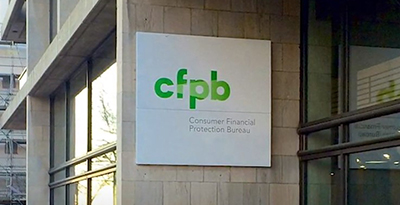
The Townstone Decision: Implications for the CFPB and Mortgage Banks

Last week, a court decision dealt a significant blow to the Consumer Financial Protection Bureau’s enforcement authority—and it has broad implications for the nation’s independent mortgage banks as well.
On Feb. 3, a District Court in Chicago ruled in CFPB v. Townstone Financial Inc. and Barry Sturner that the Equal Credit Opportunity Act does not extend to “prospective” applicants under a plain language reading of the statute. The Court dismissed the CFPB’s complaint with prejudice, meaning the Bureau cannot bring the case against Townstone in the future.

“The CFPB’s Regulation B says creditors are prohibited from discouraging prospective applicants,” said Richard Horn, Co-Managing Partner of Garris Horn LLP, Tucson, Ariz., which defended Townstone. “But ECOA only applies to ECOA applicants—it doesn’t mention ‘prospective’ applicants anywhere in the statute or legislative history. What the Bureau was trying to say was that they’re not interpreting ECOA, but that it had the authority to promulgate the rulemaking under its general rulemaking authority to further the purpose of the statute, which the court rejected.”
“This is a clear setback for the Bureau’s ‘redlining’ theory used against independent mortgage banks, which relies on the discouragement of prospective applicants rather than demonstrating discrimination towards actual applicants,” said Justin Wiseman, Vice President and Managing Regulatory Counsel with the Mortgage Bankers Association. “The judge ruled that ‘the ECOA prohibits discrimination of ‘applicants,’ and not ‘prospective applicants,’ which it found was a complete bar to the Bureau’s chances of prevailing in this case.”

In 2017, the Bureau began its investigation of Chicago-based Townstone, a nonbank retail-mortgage creditor and broker; at the time, Townstone, a small mortgage lender, had six employees. The Bureau alleged for years, Townstone drew nearly no applications for properties in majority-African-American neighborhoods located in the Chicago-Naperville-Elgin Metropolitan Statistical Area and few applications from African Americans throughout the Chicago MSA. It accused Townstone of engaging in discriminatory acts or practices, including making statements during its weekly radio shows and podcasts through which it marketed its services, that discouraged prospective African-American applicants from applying for mortgage loans; discouraged prospective applicants living in African-American neighborhoods in the Chicago MSA from applying for mortgage loans; and discouraged prospective applicants living in other areas from applying for mortgage loans for properties located in African-American neighborhoods in the Chicago MSA.
In July 2020, the Bureau filed a lawsuit in federal district court in the Northern District of Illinois alleging Townstone violated ECOA; its implementing regulation, Regulation B; and the Consumer Financial Protection Act. In November 2020, the Bureau filed an amended complaint, which added Sturner, Townstone’s cofounder, sole owner, and sole director as a defendant, alleging the fraudulent transfer of more than $2.4 million from Townstone. The Bureau’s amended complaint sought an injunction against Townstone, as well as damages, redress to consumers, the imposition of a civil money penalty, and other relief.
However, the defendants moved to dismiss the case. “Barry Sturner is a principled human being, who believes in the rule of law and the First Amendment. He vowed to fight this ‘David versus Goliath’ battle at his own personal expense,” Horn said.
Horn, who before co-founding Garris Horn LLP was a former Senior Counsel and Special Advisor in the CFPB’s Office of Regulations and a former Senior Attorney with the Federal Deposit Insurance Corp., represented Townstone in the investigation (and was joined by a team of lawyers including the Pacific Legal Foundation). Horn devised the argument that, based on ECOA’s use of the term “applicant,” the CFPB improperly attempted to expand ECOA’s reach beyond the express and unambiguous language of the statute. Specifically, Townstone argued that while the ECOA regulates behavior towards applicants for credit, it does not regulate any behavior relating to prospective applicants who have not yet applied for credit. Townstone also made arguments based on the First Amendment’s right to free speech and the Fifth Amendment’s right to due process.
“The lawsuit was surprising in that we warned the Bureau ahead of time of what our defense would be, and it still filed the suit,” Horn said. “Remember that no lender has challenged this redlining theory before, since the 1990s, when DOJ and the banking regulators started using this redlining theory against banks. This is a first. I think the CFPB was trying to get a settlement against a non-bank; Townstone was a tiny mortgage company in 2017 and the Bureau thought it would probably just roll over. The industry is better off that Barry Sturner, and the Pacific Legal Foundation, decided to fight this fight.”
For years, courts have interpreted whether a federal agency had the power to make and enforce rules based on a 1984 case, Chevron, U.S.A., Inc. v. Natural Resources Defense Council, Inc., which generally provides that agencies only have the power to interpret statutes when the statute is ambiguous. However, in its argument, the CFPB attempted to bypass Chevron, citing a 1972 case, Mourning v. Fam. Publ’ns Serv., Inc., which gave federal agencies broader powers to make additional rules consistent with Congress’ purpose in passing the statute if there was a general grant of such authority, as there is in ECOA.
Townstone argued that Chevron took precedent over Mourning, noting that multiple courts had cited a two-step process in Chevron to determine the intent of Congress in enacting ECOA. The first step of Chevron is to determine “whether Congress has directly spoken to the precise question at issue…If Congress has spoken to the precise question at issue ‘unambiguously,’ then ‘that is the end of it: the agency and courts alike are bound by what Congress wrote….However, if Congress has ‘not spoken clearly,’ the court moves on to steptwo, in which the court ‘consider[s] whether the agency’s interpretation reflects a permissible construction of the statute..”
Judge Franklin U. Valderrama of the U.S. District Court for the Northern District of Illinois, Eastern Division, agreed with Townstone. “The CFPB argues that it has more expansive enforcement powers than the private right of action, and moreover, its authority to prohibit discouragement of ‘prospective applicants’ does not require stretching the term ‘applicant’ to encompass ‘prospective applicants,’” Valderrama wrote. “The Court disagrees. The CFPB’s authority to enact regulations is not limitless.”
Valderrama further noted the plain text of the ECOA “clearly and unambiguously prohibits discrimination against applicants, which the ECOA clearly and unambiguously defines as a person who applies to a creditor for credit. The Court therefore finds that Congress has directly and unambiguously spoken on the issue at hand and only prohibits discrimination against applicants. As such, ‘that is the end of it,’ and the Court need not move on to the second step of the Chevron analysis because it is clear that the ECOA does not apply to prospective applicants.”
Horn said he was encouraged by the favorable decision. “It was a great ruling for the rule of law,” he said. “I was not surprised the court ruled this way; this is really what the law is, and agencies cannot make law. The Bureau was trying to rely on its general rulemaking authority, saying it can essentially issue any rule that it believes furthers the purpose of the statute. The judge basically said the CFPB can’t expand the boundaries of the statute under that authority. Given that most of the CFPB’s other statutes have this same general rulemaking authority, which the agency relies on frequently, this ruling could help support future defenses by companies in combating the CFPB’s ‘regulation by enforcement’ and aggressive interpretations in the future.”
Horn added that the Bureau’s intended definition of “prospective applicant” went particularly further than the actual meaning of that term, and an actual applicant. “Under the Bureau’s definition of ‘prospective,’ we’re all prospective astronauts and heart surgeons,” he said.
Wiseman said the Bureau has the option to appeal to the 7th Circuit and then to the Supreme Court if it wishes and that as a District Court opinion it has no binding impact on other courts. But he noted “The Townstone case had been closely watched as one of the first to be litigated under the Bureau’s theory. It is expected that any future litigants would point to this opinion unless modified on appeal.”
Horn agreed. “I do think internally, the Bureau will be considering an appeal, because this is a highly visible loss—some have called it ‘devastating’—and could also help future challenges to its rulemaking authority,” he said.
MBA Education will hold a webinar, Townstone Financial: Implications and Takeaways, on Tuesday, Feb. 14, from 2:00-2:45 p.m. ET. Horn, Wiseman and Jessica Thompson, an attorney with the Pacific Legal Foundation, will walk attendees through the key elements of the case, the decision by the Illinois Federal Court to dismiss the CFPB’s case, and the implications for future ECOA claims and enforcement.
For more information and to register, click here.
